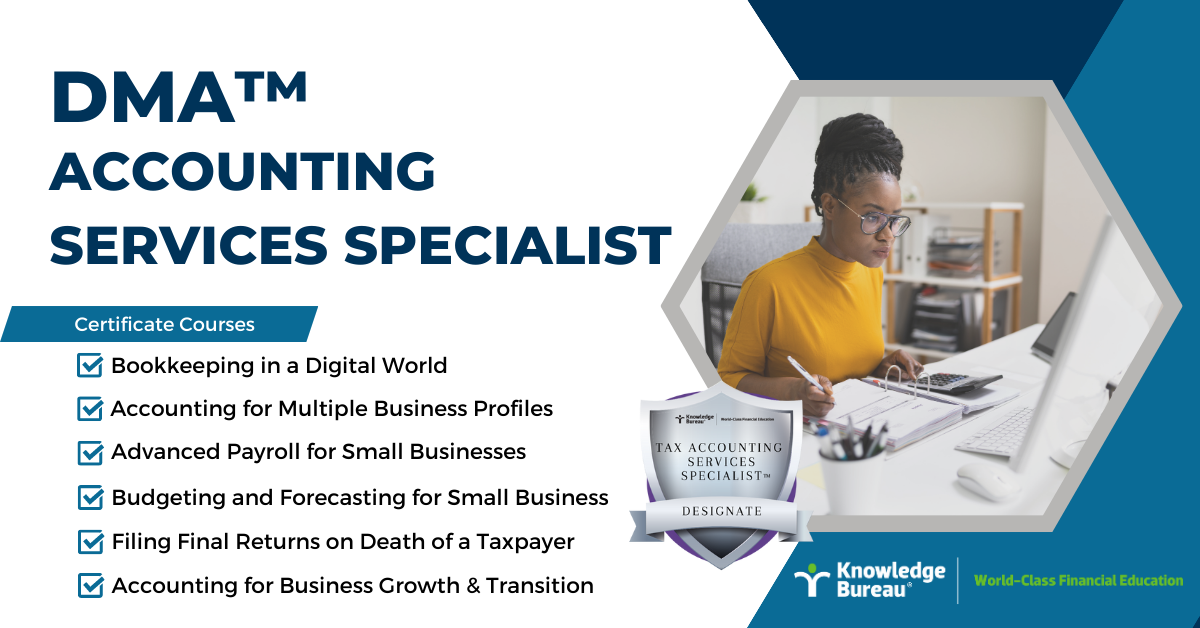Bookkeeping in a Digital World

Did you know: the accounting, tax, bookkeeping and payroll services represent 23.6 billion, showing an 8.9% increase annually. This according to Statistics Canada shows that this is a healthy, and essential, industry for Canadians. That’s why now may be the right time to enhance your professional education with the Certificate Course Bookkeeping in a Digital World.
Bookkeeping in a Digital World is the perfect course for professionals in the tax, accounting and financial services, who wish to train their administrative staff to prepare company books, or for those with the professional role of preparing books for others.
Bookkeepers who know how to run software, but have no education in theoretical accounting, also benefit from taking this course, which is the first in the DMA™ – Accounting Services Specialist Designation program.
This course will also help those that are considering starting their own business, by providing information on the types of organizations and what will be expected of them from the regulatory bodies.
Here’s what you will learn: You will gain a sound working knowledge of how to set up a CRA-compliant bookkeeping system for a small business; how to analyze transactions and report these within the accounting cycle, in a double-entry bookkeeping system, using accounting software and then present financial statements to the accountant, for tax preparation and review. You'll also gain an understanding and appreciation for the professional and ethical requirements of a bookkeeper.
As well, you'll acquire the ability to analyze and report transactions that require knowledge of GAAP, an expert understanding of the accounting equation, T accounts, debits and credits. You will also have a basic understanding of the tax structure imposed on businesses and achieve a sound ethical compass, expert organizational skill, the ability to seek out and correct accounting errors and inconsistencies, expert data entry skills and a sound understanding of financial statements.
- Chapter 1 | The Roles and Responsibilities of the Bookkeeper
- Chapter 2 | Types of Organizations, Fiscal Periods and Accounting Cycles
- Chapter 3 | Types of Accounts, the Basic Accounting Equation and the Chart of Accounts

- Chapter 4 | General Ledger, Trial Balance & Special Accounts
- Chapter 5 | Journals, Registers and Ledgers - I
- Chapter 6 | Journals, Registers and Ledgers - II
- Chapter 7 | Fundamentals of Cash-basis and Accural Accounting
- Chapter 8 | Period-end Procedures
- Chapter 9 | Documentation, File Maintenance & Due Dates
- Chapter 10 | Payroll – an Introduction
"Having successfully completed financial accounting courses in my Business Administration program, I did not feel that the Basic Bookkeeping course would cover any new topics I did not already know, but I was wrong. This is a great refresher course or foundation course for anyone wanting to enter into this field. The online learning environment allows you to work at your own pace, the website is easy to navigate, and the online support is quick to respond and effective. I can’t wait to dive into the second of my six courses required for my bookkeeping designation. Thank you for your call today, and support, it was very nice to be acknowledged for my accomplishments. Not only is the Knowledge Bureau a great learning institute, but also a top-notch service provider, the staff go out of their way." -Dawn S., BC